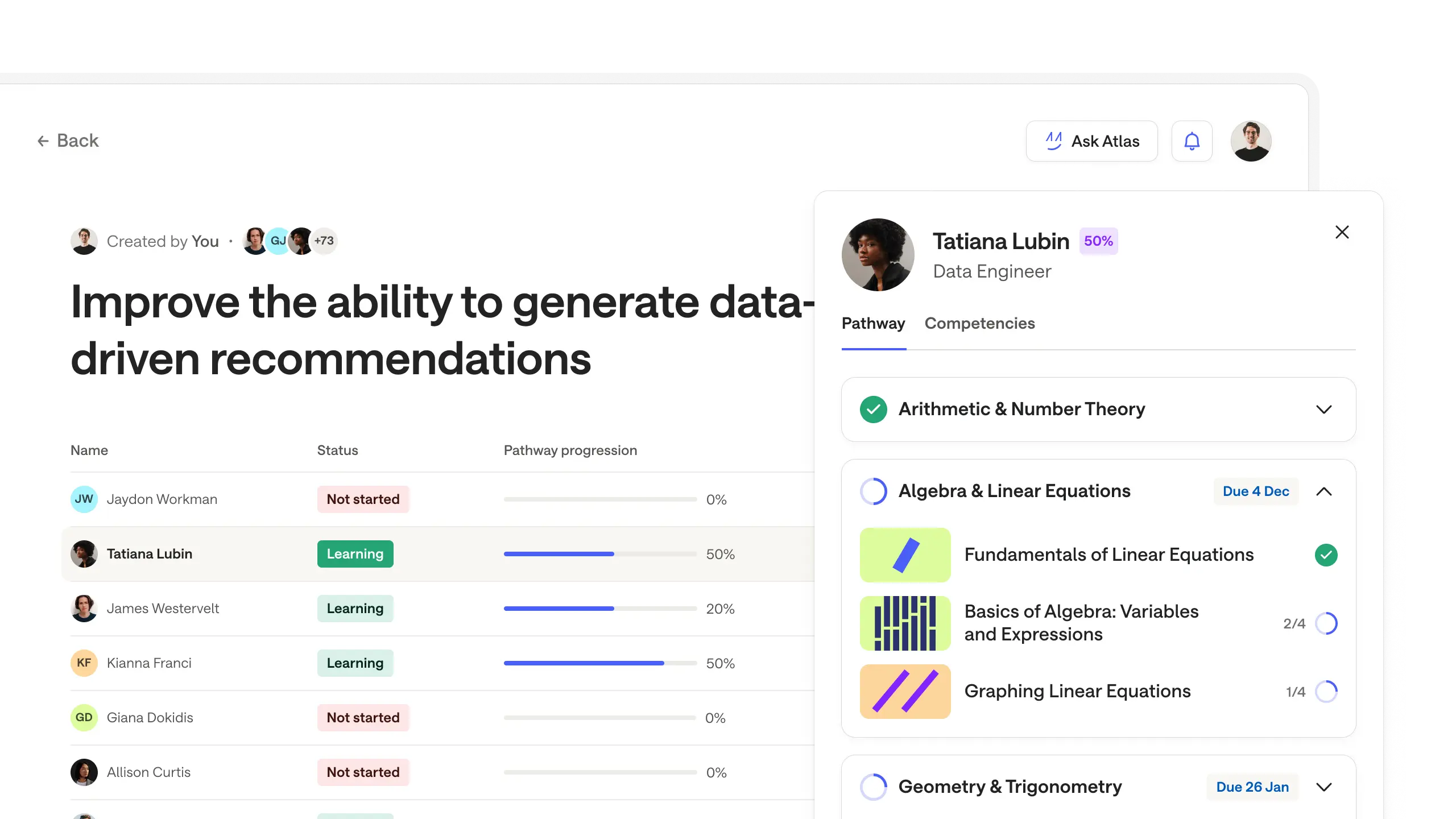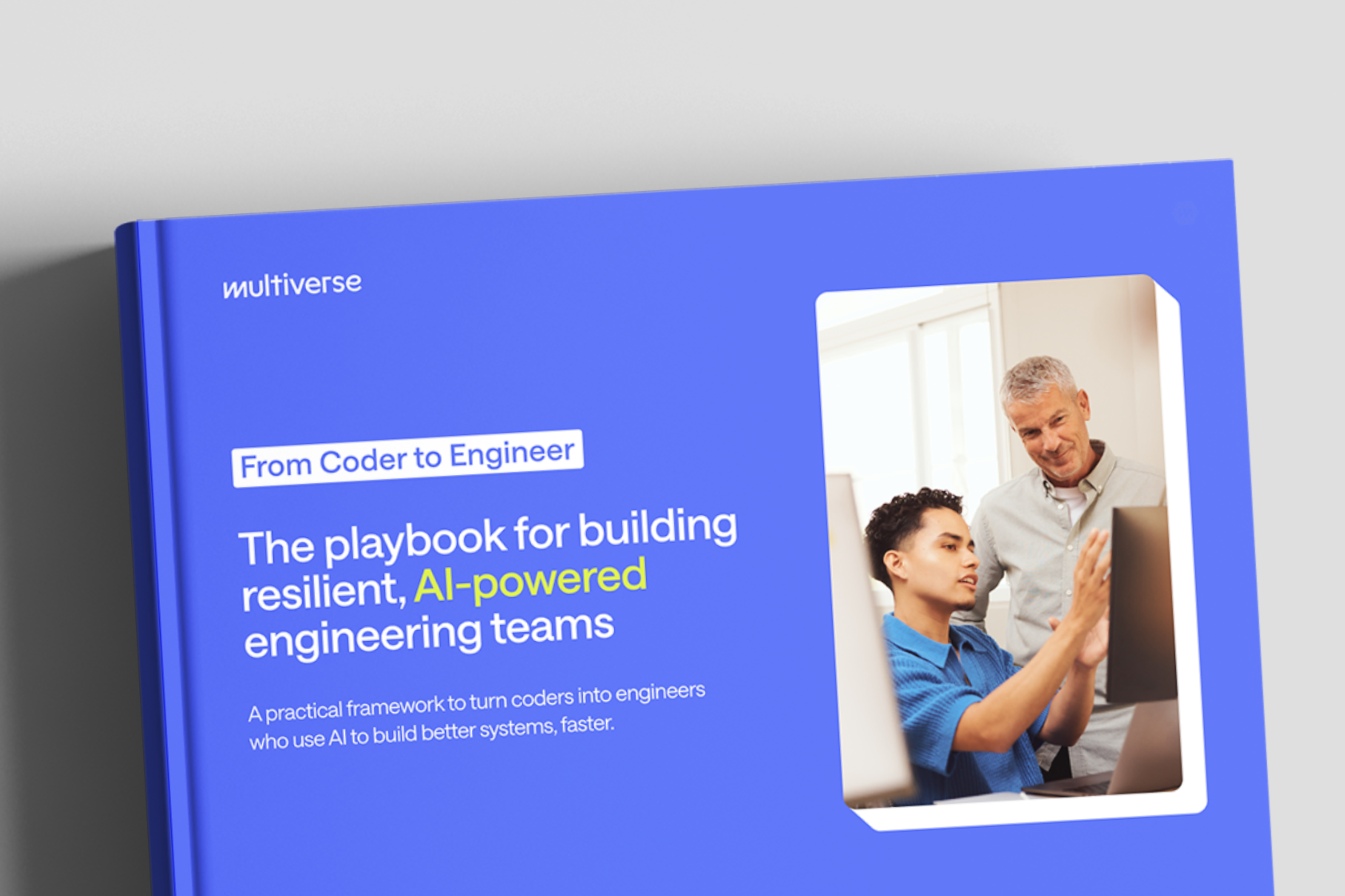The age of AI is officially here and the business landscape is changing fast. But a widening AI skills gap means keeping pace with technological innovation is a formidable challenge. Failing to act now could cost you.
It’s no surprise, then, that businesses are feeling the pressure. Our Preparing for the AI Revolution Report finds that over two-thirds of leaders believe their organisation will need to shift their workforce skills to stay competitive as we head into 2030 and beyond.
Employers must act now to transform and future-proof their workforce, by upskilling their existing employees to close critical technical skills gaps.
New data: Businesses need to act now on the AI skills gap
Business leaders are seeing a fundamental mismatch between the skills they have in-house, and the skills they know they’ll need into the future. According to our findings, leaders see the biggest skills gap in artificial intelligence (AI).
But that isn’t the only area of concern. More than seven in 10 business leaders say that their skills gaps in data analytics and software engineering are likely to persist into the new decade.
Despite these glaring technical gaps, business leaders are hopeful that AI will vastly improve the way they work. More than two thirds say AI will improve productivity and customer experience (69%) and create more informed business strategies (68%).
There’s a huge opportunity: but it brings with it huge risk: the cost of doing nothing is high. Half of the leaders surveyed believe an AI skills gap will negatively impact revenue growth, productivity, and profitability.
Discover AI strategy and skills insights from 800 tech leaders
The AI skills your workforce needs are evolving fast. Learn how to future-proof your teams.
A closer look: AI adopters vs. AI sceptics
Business leaders are in agreement: AI will shift the nature of work.
But within our survey, we identified a clear division between the AI adopters, and the AI sceptics. Both groups are facing the same challenges and priorities, but their responses couldn’t be farther apart. While AI advocates are already embracing intelligence-driven technologies, the AI sceptics are more reluctant to adopt new work solutions.
The difference between these two approaches could also mean the difference between success and failure in the future business landscape.
With 4 in 5 leaders moving quickly to implement AI skills training for existing employees, now is the time to prepare for a world driven by intelligent technology — or risk getting left behind.
Our research found that AI adopters were 37% more likely than AI sceptics to invest in their people, with nearly 90% of AI adopters predicting increased training and development budgets, compared to 65% of AI sceptics.
While the AI sceptics are holding to a wait-and-see approach, AI adopters are moving swiftly into the future, and are 50% more confident that their workforce will be prepared for the challenges AI brings by 2030.
The eagles are diving head-first into the opportunities that artificial intelligence can create, while the ostriches risk being left with their heads in the sand.
Employers need a new skills strategy to succeed in the future of work
As market pressures put a higher premium on talent retention and skills development, the workforce of the future requires a continuous focus on skills development at every level of the business.
According to our findings, a growing number of businesses are embracing alternative hiring and training methods to close critical technical skills gaps. Upskilling existing employees is the perfect place to start – in fact, 76% of business leaders plan to increase their investment in employee upskilling. In a similar vein, 73% plan to invest in reskilling existing employees into new roles.
At the entry level, nine in 10 businesses are open to widening their hiring criteria and 71% of leaders say their organisation is likely to invest in expanding training programs for employees at the start of their careers.
By leveraging the power of on-the-job training to build new skills and capabilities, via upskilling, reskilling, and new hiring methods like professional apprenticeships, leaders can meet the increasingly urgent demand for tech, data and engineering skills, and build a workforce that is truly future-ready.
Building the workforce of 2030: Read our latest research
The future of work is data-driven, AI-enabled, and radically more equitable. By embracing the power of on-the-job learning, businesses can close their critical skills gaps and achieve greater success in 2030 and beyond.
That's why at Multiverse, we’re transforming careers through the power of applied learning and on-the-job training.
Discover the full AI skills gap report
Learn how to build a future-proof skills strategy.







